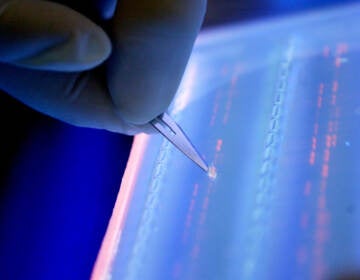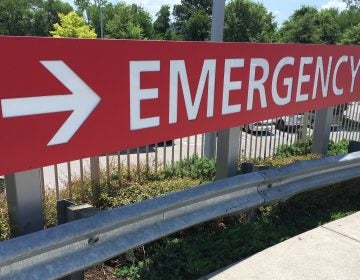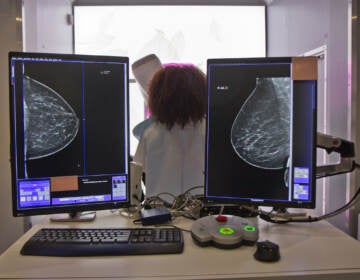A mobile mammogram truck is offering free screenings to women in North Philly
Breast screening rates have dropped during the pandemic in communities of color. A health system is bringing mammograms directly to women in need.
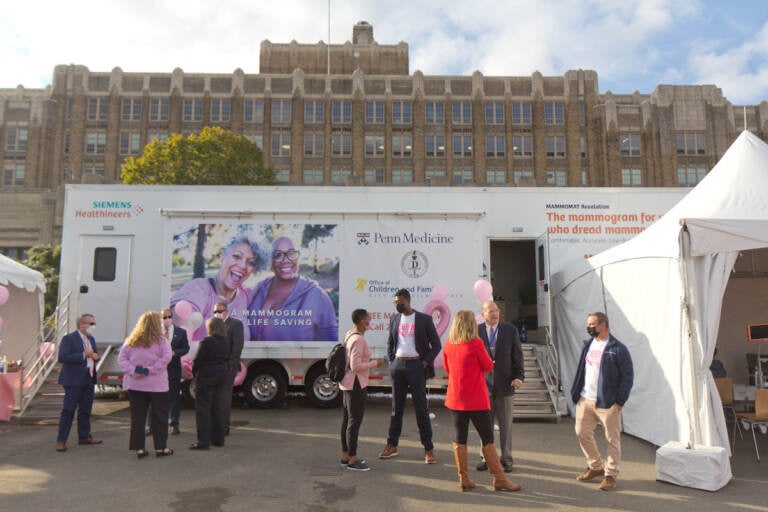
Penn Medicine’s mobile mammography unit offered free breast cancer screenings to women over the age of 40 in a North Philadelphia parking lot on Oct. 22, 2021. (Kimberly Paynter/WHYY)
Lanette Bowen was leaving the local Save-A-Lot supermarket in her North Philadelphia neighborhood when she noticed a big white tent sitting across the parking lot. To Bowen’s surprise, it was a breast cancer screening truck, fully equipped with medical staff.
On Oct. 18, Penn Medicine rolled into the West Lehigh neighborhood to provide free 3D mammograms for women over 40 who are in need. Staff on the screening bus, located across from Murrell Dobbins Career and Technical Education High School on West Lehigh Avenue, provided individual 10-minute screenings, a private changing room, and Spanish translation services. The initiative adds to the University of Pennsylvania’s commitment to eliminate disparities in cancer detection, care, and outcomes among low-income patients and communities of color.
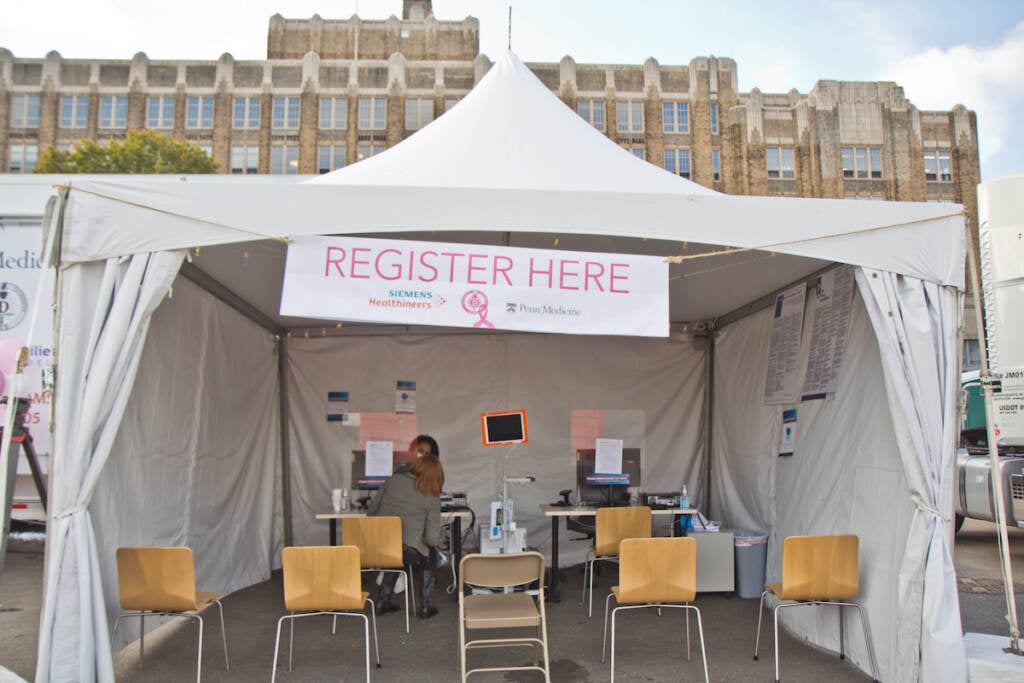
For years, doctors have observed a higher and earlier prevalence of breast cancer in Black women in particular. Experts say it has also been shown that Black women are more likely to have a more aggressive kind of cancer known as triple-negative breast cancer, which has a poorer survival rate. And studies show that cancer disproportionately impacts lower socioeconomic groups and the medically underserved because they are unable to access cancer screening tests, which contributes to late-stage cancer diagnoses.
Bowen, who’s a Black woman, said she gets her mammogram annually and encourages her friends and family to do the same. Though she’s a patient with Temple Health, she said, she enjoys the ease of the mobile mammography unit.
“I don’t have to wait in a waiting area at the hospital or try and get an appointment,” said Bowen. “So I figured this was a good idea and [more] convenient.”
DaCarla Albright is an OB-GYN at Penn Medicine as well as a professor of clinical obstetrics and gynecology at the University of Pennsylvania. She said women of color have been underrepresented in the many clinical studies used to determine breast cancer screening guidelines. And with the earlier incidence of breast cancer observed in Black women in particular, Albright encourages her patients of color to practice what she calls breast self-awareness.
“Pay attention to any skin changes, paying attention to any rashes, anything that just doesn’t feel normal or right,” Albright said. “Bring it to the attention of your doctor. If you don’t have a doctor, make an appointment.”
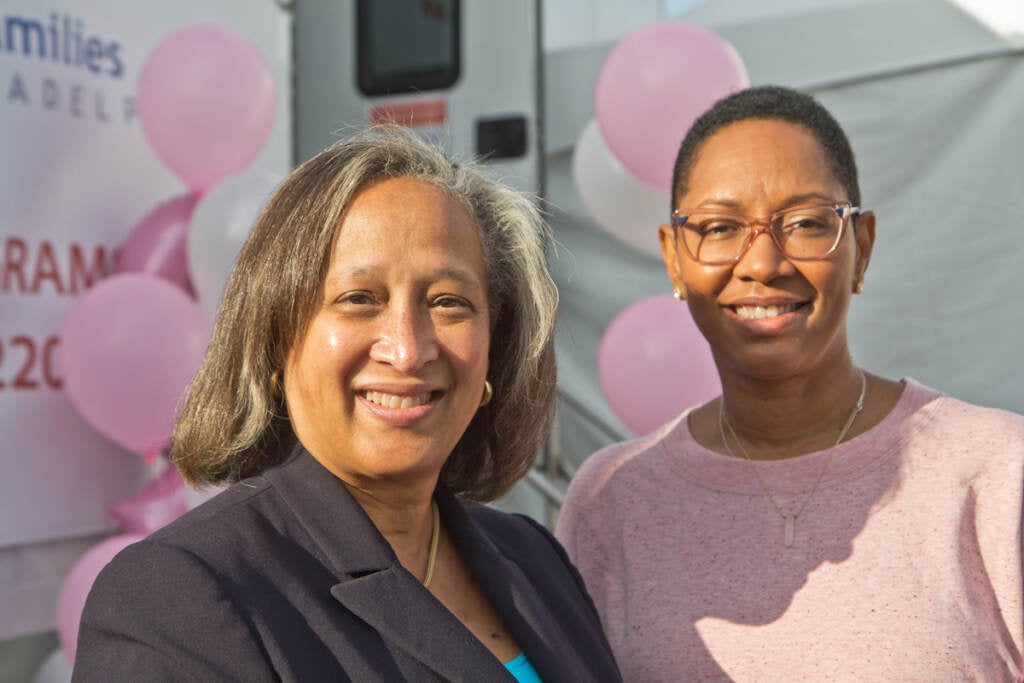
Women are invited to get screened for breast cancer at Penn Medicine’s mobile mammography unit regardless of health insurance status. After being screened, if there is a positive finding on the mammogram, participants will most likely have a follow-up imaging study. And if there continues to be a finding there, a radiologist will recommend additional interventions as necessary, depending on what is seen.
A little over half of breast cancers in Black women are diagnosed at an early stage, when they’re most likely to be treated successfully, compared to 64% of cancers detected early in white women. The delays have wide-reaching effects for survival: Only 81% of Black women diagnosed with breast cancer live to five years after their diagnosis, compared to 91% among white women with the disease. Albright said an increase in screening rates among women of color is one of the steps toward eliminating racial breast cancer disparities.
But access to care, particularly insurance coverage, remains one of the biggest barriers.
“Do people have the financial means [and] adequate coverage to actually access their health care screenings?” Albright said. “If a mother has to [prioritize] child care or going to her job versus [a breast cancer] screening, it is so much easier to offer an opportunity directly in someone’s neighborhood.”
As part of the initiative, Penn Medicine partnered with Dobbins High School, located across from the screening unit, to engage local students in breast cancer education and advocacy. Students were invited to hear from members of Penn Medicine, tour the screening van, talk to the technologists, and even consider careers in the field.
“What we really had hoped for with the Dobbins High School students is to show them that there are careers in allied health professions and other STEM professions and make it real for them,” said Linda Nunes, vice chair of inclusion, diversity and equity for the Department of Radiology at Penn Med.
The mobile unit, a 54-foot-long Siemens Healthineers model featuring the company’s MAMMOMAT Revelation digital mammography system and accredited by the American College of Radiology, will be used to screen women through Oct. 29.
Though 2D screenings were the conventional technology many years ago, Allbright said, 3D technology for breast cancer screenings came to market around 2011 and is now considered the gold standard.
“It is the best screening technology out there,” said Albright, “and it’s able to see the breast from many different angles and directions and really can detect very, very early cancers.”
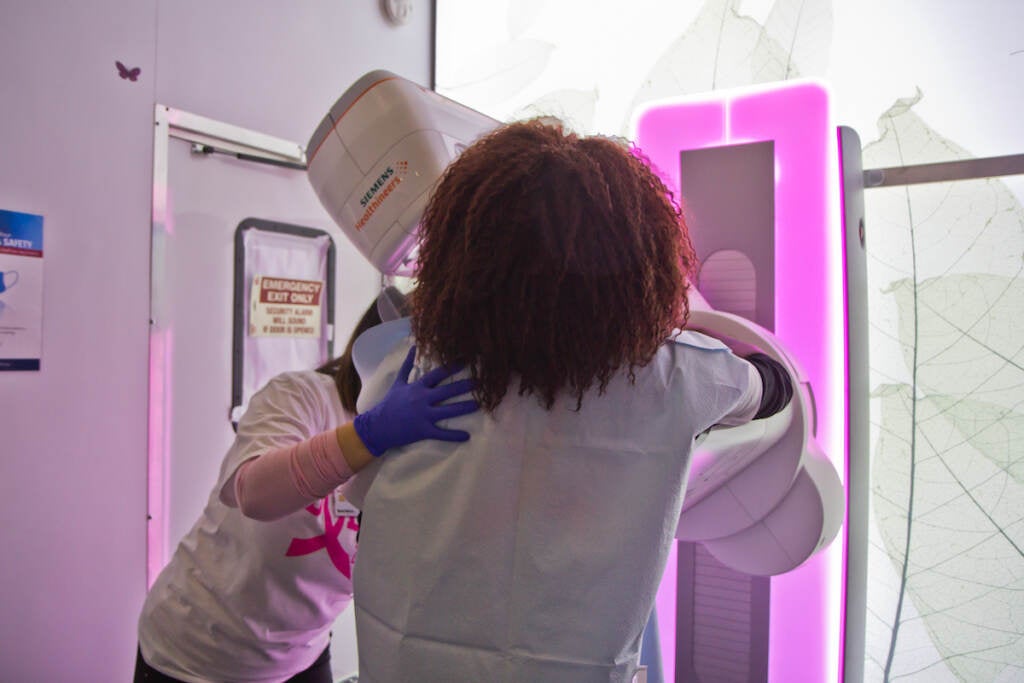
Dr. Carmen E. Guerra is an associate professor of medicine at the University of Pennsylvania and a health equity researcher who studies cancer-screening disparities in Black and immigrant communities. She said the COVID-19 pandemic has had far-reaching consequences on medical screening rates in communities of color. And the numbers have been especially stark for cancer-screening rates, which Guerra said dropped by 90% for colon and breast cancer at the height of the pandemic.
In December 2020, Prevent Cancer Foundation, in collaboration with Omnibus, conducted a survey in which 1,200 Black, Hispanic, Asian, and Native American people were asked questions about their reasons for missed cancer screenings and medical appointments during the pandemic. The survey found that communities of color, across age and ethnicity, were more likely to have missed appointments during the pandemic than white Americans, with Black and Hispanic Americans about 40% more likely to have missed, postponed, or canceled a health appointment.
Charles Reyes is the community school coordinator for the Mayor’s Office of Children & Families at Dobbins High School. He said the mobile breast screening unit in his North Philadelphia neighborhood is a welcome source of relief after the devastation that the pandemic has brought.
“Knowing that women have been putting their mammograms off for the last two years and then to bring a resource like this in the community is unbelievable,” said Reyes. “You can’t get any better than that.”
Penn Medicine’s breast screening effort will continue weekdays through Friday, Oct. 29, from 9 a.m. to 7 p.m. Registration is encouraged, but walk-ups are welcome. To register for a mammogram, please call 267-414-2205.
—
Support for WHYY’s coverage on health equity issues comes from the Commonwealth Fund.
 WHYY is one of over 20 news organizations producing Broke in Philly, a collaborative reporting project on solutions to poverty and the city’s push towards economic justice. Follow us at @BrokeInPhilly.
WHYY is one of over 20 news organizations producing Broke in Philly, a collaborative reporting project on solutions to poverty and the city’s push towards economic justice. Follow us at @BrokeInPhilly. 
Get daily updates from WHYY News!
WHYY is your source for fact-based, in-depth journalism and information. As a nonprofit organization, we rely on financial support from readers like you. Please give today.


